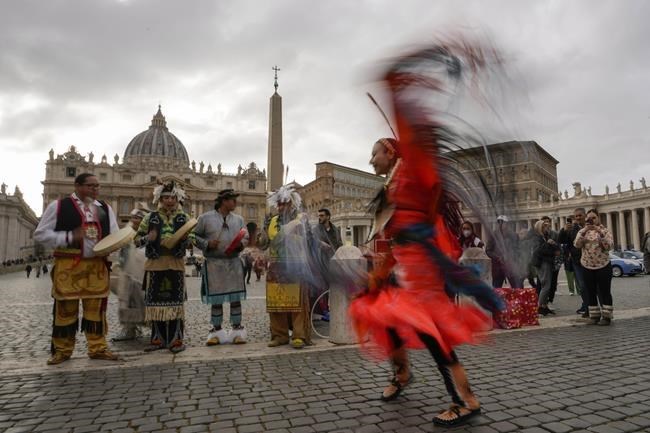
Members of the Assembly of First Nations perform in St. Peter's Square at the Vatican, Thursday, March 31, 2022. First Nations, Inuit and Métis delegates are set to have a final meeting with Pope Francis in the Vatican today. THE CANADIAN PRESS/AP-Alessandra Tarantino
Republished April 01, 2022 - 11:27 AM
Original Publication Date March 31, 2022 - 11:11 PM
ROME - Chief Wilton Littlechild felt a swell of emotions and tears in his eyes as he heard Pope Francis apologize at the Vatican on Friday for the Roman Catholic Church's role in residential schools.
The words came on the chief's 78th birthday. It was especially meaningful, he said, because during the 14 years he attended residential school as a child in Alberta, he was not allowed to celebrate.
"I hoped for it. I prayed for it. I dreamt for it," he said. "But I never expected to live and see and feel it."
The pontiff stood before a room of nearly 200 Indigenous delegates in the Sala Clementina, one of the halls of the Apostolic Palace, and asked for God's forgiveness for the deplorable conduct of church members.
"I want to say to you with all my heart: I am very sorry," Francis said in Italian during a final meeting with First Nations, Inuit and Métis delegates.
"And I join my brothers, the Canadian bishops, in asking your pardon."
Francis said he felt shame and sorrow that Catholics, particularly those in charge of education, caused such significant harm. He also said he will come to Canada, possibly in the summer.
Tears streamed down Angie Crerar's face too. The 85-year-old Métis elder said she could see that Francis spoke with sincerity.
"My heart is so full I can hardly speak," she said.
The hour-long meeting was a mix of solemn prayer with moments of laughter, music and dance. Elder Fred Kelly prayed for the children who went to residential schools and another prayer was done in the Dene language. "Our Father" was sung in Inuktitut.
It was the culmination of years of work in Canada and a week of meetings at the Vatican, said Chief Gerald Antoine, the Assembly of First Nations delegation lead.
It felt like seeing fresh moose tracks in the snow, Antoine said, when you know there's a real possibility of success.
Natan Obed, president of Inuit Tapiriit Kanatami, said that in the moment of the apology, he couldn’t help but think about how people can change the world. He thought about how there can be a path toward justice.
"Behind the coverups, behind the indifference over a 100 years, behind the lies, behind the lack of justice, this Pope — Pope Francis — decided to go right through it and decided to speak words that First Nations, Inuit and Métis have been longing to hear for decades," Obed said.
Some members had expressed their apprehension and anxiety prior to the week's final meeting with the Pope, because they were unsure what the outcome would be.
“I know how important those words are going to be for our survivors back at home," said Cassidy Caron, president of the Métis National Council.
An estimated 150,000 Indigenous children were forced to attend residential schools and more than 60 per cent of the schools were run by the Catholic Church.
The Indigenous groups involved in the delegation also requested the church provide reparations to support healing, return Indigenous artifacts and share any documents about residential schools.
Prime Minister Justin Trudeau said he looks forward to Pope Francis coming to Canada to deliver that apology in person and commended the bravery and determination of survivors who advocated for it.
"Today's apology is a step forward in acknowledging the truth of our past in order to right historical wrongs, but there's still work to be done," he said in Ottawa.
The Truth and Reconciliation Commission of Canada released an extensive report that detailed mistreatment at the schools, including emotional, physical and sexual abuse. It included a call to action that the Pope deliver an apology on Canadian soil.
At the Vatican, there was an exchange of gifts to mark the day. Pope Francis received a cross made with baleen, a filtration system in a bowhead whale's mouth, placed in a sealskin bag. He was also given a beaded leather stole, which is a liturgical vest, traditional handmade snowshoes, as well as a book of memories from residential school survivors.
In return, the Pope gave each Indigenous group a bronze olive branch as a sign of peace and reconciliation, said the Canadian Conference of Catholic Bishops.
Murray Sinclair, the former chair of the Truth and Reconciliation Commission, said in a statement that the apology is an important step and long past due.
He said he thought of Littlechild, who has been on the journey to Rome for a long time, and wished him a happy birthday.
"I wish we could go back in time to tell that six-year-old who attended a residential school in Alberta, that one day he would be in the room, hearing an apology directly from the Pope, for all he has been through," Sinclair said.
The Indian Residential Schools Resolution Health Support Program has a hotline to help residential school survivors and their relatives suffering trauma invoked by the recall of past abuse. The number is 1-866-925-4419.
This report by The Canadian Press was first published April 1, 2022.
News from © The Canadian Press, 2022